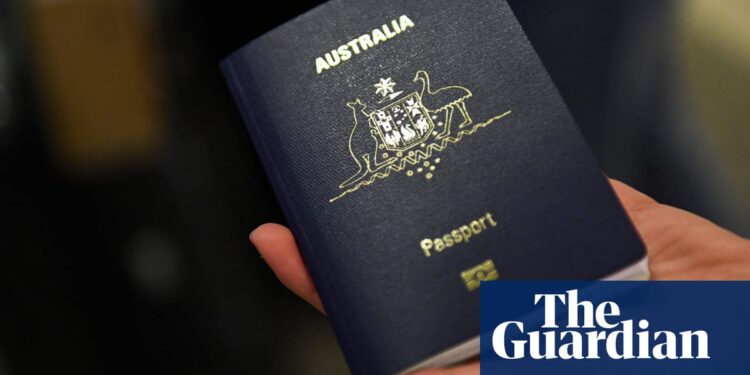At least 18 officials within the federal government’s passport office are facing investigation after a scathing audit report revealed multiple instances where conflicts of interest were not declared and preferred suppliers had wrongly been identified ahead of time across $1.6bn in contracts.
The Australian National Audit Office’s report into the Department of Foreign Affairs and Trade’s Australian Passport Office, released Thursday, found its contracting processes “fell short of ethical standards”, including a failure to keep proper documentation, appropriately deal with conflicts of interest and find value for money.
The audit examined 73 of the office’s contracts, worth $405.1m, out of a total of 331 contracts worth $1.58bn – between July 2019 and December 2023 in detail. Of those, it found only 29% were available to a “genuinely” open market, meaning more than one supplier was invited to quote in a process that “did not have a pre-determined outcome”.
In 53 of the 73 contracts, the office had picked its preferred supplier before going public with the contract requirements. The audit found 20 of those 53 invited other candidates to “compete” but determined “the decision had already, in effect, been taken as to which supplier would be contracted”.
A preferred supplier was handed a $465,590 contract in one of the processes, despite submitting its tender late. Dfat’s approach to market had stated “a quotation received after the closing time, other than through mishandling by DFAT, will be set aside and not evaluated further”.
In one case, a contractor working in the passport office’s procurement team emailed a subordinate outlining his preferences for a contract extension.
“Hey mate, With my contract coming up – if APO wants to re-engage me – I would like to go through [staff member] at Peoplebank [Peoplebank Australia Ltd] for the engagement and preferably for six month contract terms, if possible. Happy to get that kicked off whenever you are,” the contracted manager said.
The subordinate responded: “To [sic] easy, I’ll get started on the approach direct to Peoplebank for your position.”
The department publicly reported the contract was a competitive process, despite it being directly sourced.
The ANAO said it had also found instances where the individual engaged contractors to Dfat with whom they had “pre-existing social connections” – evidenced by email and calendar records.
On one occasion, the contractor helped introduce an acquaintance to find contract work in a different area and was given a gift voucher as a gesture of thanks.
Elsewhere, the ANAO also identified at least 16 instances across the 73 contracts examined where a conflict of interest existed but was not declared across the 73 contracts examined in detail.
In one example, no conflicts were declared in the awarding of a $1.4m contract with Peoplebank for a service designer. The audit found the evaluation panel’s chair had previously been the employer of one of the specified personnel being assessed. The chair had requested the candidate be considered and the ANAO said records indicated the person was the preferred candidate prior to approaching the market.
after newsletter promotion
Another example identified one official had declared a conflict of interest but was still involved in contracting a supplier, which listed their spouse as a specified personnel. The same Dfat official was involved in a separate direct procurement where they were the approver and the manager of a contract that listed their spouse as one of the personnel to provide the services.
ANAO said it first informed Dfat of the “integrity and ethical matters” it uncovered in April 2024 but was told by the department it “did not have sufficient investigatory resources to examine the matters identified”. After further issues were found, Dfat brought in an experienced investigator from the defence department.
As a result, 18 employees and contractors from the passport office are being investigated or being considered for investigation or referral.
The audit office raised concerns there could be other contracts needing a deeper look given it had only looked at a sample of 73 out of a possible 331 during the time period.
In its response to the report, Dfat said it had initiated a “wide-ranging internal audit” of its contracting processes across the department.
“The audit came at a time when the department was assessing the effectiveness of the current procurement model,” the department’s statement said.
“As a result of both reviews, the department’s procurement practices will be amended to improve compliance and efficiency.”






